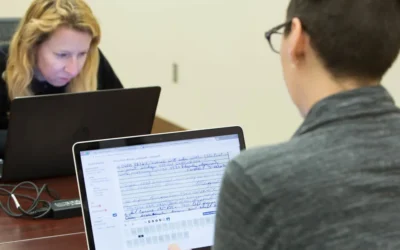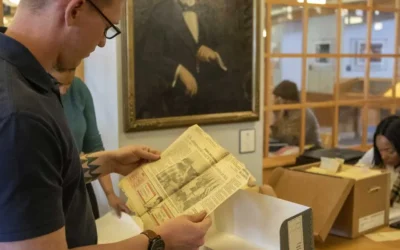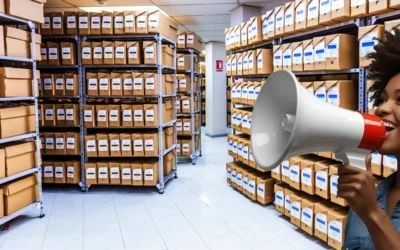Evaluating Archival Workflows and Programs
Margot Note
As you perform archival work—either operational or project-based—it’s essential to evaluate your workflows and procedures as a continuous part of your duties. Conducting check-ins provides opportunities for assessment and reevaluation.
For archival staff, this process could occur in meetings where the team discusses the current state of their department. For lone arrangers, marking a day or an afternoon quarterly for a “step back” and self-reflection allows you to gauge your systems without distraction. If you’re working on a project, you may also wish to perform more formal evaluations at critical points during the project lifecycle, such as at milestones.
Areas to Assess
You should assess the following areas:
- Are workflows efficient, or do bottlenecks occur?
- What changes can you make to improve the methods and procedures you’re using?
- What can you do to work more effectively?
- What’s holding you back? What obstacles do you perceive?
- Are your procedures well-documented?
- Are your guidelines being followed?
- Are measures of quality being met?
- What activities have a minimal impact? If you stopped doing them, would anyone notice?
- Conversely, are there activities that you should start doing that will make a difference with your stakeholders and users?
- What’s frustrating you? What’s keeping you from doing what you know you should be doing?
Reviewing the Archival Program
In addition to workflow evaluation, archivists should periodically review the effectiveness of the archival program. This activity is especially important when the scale of the program expands or when there are new hires. Workflows that function well for small projects or departments may prove inefficient for larger ones, and processes may need to be streamlined to maintain an acceptable level of productivity.
If you’ve been in your position for a while, or work with colleagues who have, it’s easy to continue with outdated or overly complicated procedures because you have always performed work in that manner. “That’s how it’s done here” or “we tried that once, but it didn’t work” are unfortunately common refrains. Traditions run deep and change management—the activities to prepare and support individuals, teams, and institutions in making organizational change—is difficult. However, critically reviewing your program and how it can be improved by doing things in new ways is worth the effort. So much of the work that archivists do is invisible to our patrons. We need to ensure that we are expending energy on doing the most highly valued and recognized activities. How can we streamline archival work?
More Product, Less Process
For instance, if you’re conducting a digitization project, your metadata practices may be streamlined over time by placing less emphasis on detailed description so that items may be processed quicker. Perhaps you could readjust the metadata strategy you created at the start of the project for maximum information communication and speed. Embrace the “more product, less process” philosophy expressed by Mark A. Greene and Dennis Meissner that advocates minimal processing as a means of eliminating backlogs and maximizing access to materials. You may need other strategies for improvement, including training new staff members and reassigning existing ones to take on new duties.
Here to Serve Our Users
Aim to maintain an attitude of flexibility and customer service. Realize that policies and procedures change over time and be willing to adjust when needed. Integrating evaluation and assessment into your work will make it easier for you to do your job easier and find and correct issues before they become problems. In an environment where archivists must do more with less, concentrate on the activities that will have the most impact with the minimum investment of time, cost, and resources. You deserve it, and your users will see the difference in their experience with your archival repository.
Margot Note
Margot Note, archivist and consultant, is a guest blogger for Lucidea, provider of ArchivEra, archival collections management software for today’s challenges and tomorrow’s.
Get your free copy of Margot’s brand new book for Lucidea Press, Demystifying Archival Project Management: Five Essentials for Success!
Similar Posts
Collaborative Archival Relationships
Collaborative projects are instrumental in showcasing how archival collections can benefit various organizational departments.
Informational, Evidential, and Intrinsic Values within Archives
Archives provide authentic, reliable information and hold values that reflect their functions and uses; informational, evidential, and intrinsic.
A Sustainable Archives
Archivists prioritize sustainable practices and policies, rooting their work in ethics of care, often preferring digital processing and preservation
Archival Branding and PR Strategies
Archivists who adopt branding and PR strategies both safeguard historical treasures and contribute to their organizations’ evolution.




Leave a Comment
Comments are reviewed and must adhere to our comments policy.
0 Comments